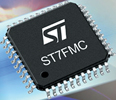8-bit microcontroller family now qualified for automotive use
24 January 2007
DSP, Micros & Memory

STMicroelectronics′ ST7FMC microcontroller family has been Automotive-Grade qualified to meet the specific and rigorous demands of the automotive market.
Built around an industry-standard 8-bit core and designed for driving brushless direct current (BLDC) motors, the microcontroller family is ideal for use in various car body applications such as fuel and water pumps, cooling fans and interior blowers.
The ST7FMC family features higher system integration compared to alternative microprocessor or DSP-based approaches. The micros minimise the need for external components, and reduce PCB space, thus lowering the cost of the overall application.
The family features an embedded motor-control cell, which includes six-phase pulse-width modulation (PWM) control, voltage or current sensing and a highly flexible 'back electro-motive force' (BEMF) detector for the sensorless control of permanent-magnet BLDC motors. All the application-specific devices in the family now operate over the full automotive temperature range of -40 to 125°C and include safety features such as current sensing used for stall detection, asynchronous emergency stop, write-once registers and clock security system (CSS). ST's patented algorithms also enable the motor-control cell to offer unique fail-free motor-starting capabilities. It also has an integrated local interconnect network (LIN) communication interface.
Housed in tiny TQFP32 and TQFP44 packages, all devices in the family are supported by a range of state-of-the-art development tools.
Further reading:
Memory for asset tracking
Altron Arrow
DSP, Micros & Memory
The Page EEPROM, ST’s latest memory, has been designed for efficient datalogging and fast firmware upload/download in battery-operated devices.
Read more...
Engineered for high-reliability applications
Future Electronics
DSP, Micros & Memory
The MCX E series of Arm Cortex-M4F and Arm Cortex-M7 microcontrollers from NXP are engineered for demanding industrial and IoT environments.
Read more...
NXP’s development platform guide
DSP, Micros & Memory
Choosing between the FRDM i.MX 93, FRDM i.MX 91 and FRDM i.MX 91S development platforms can be intimidating, but once designers understand how each platform aligns with their application’s requirements, the decision becomes straightforward.
Read more...
XJTAG launches two new Flash programmers
ASIC Design Services
DSP, Micros & Memory
XJTAG has announced XJExpress and XJExpress-FPGA, a pair of Flash programmers perfect for development, debug and in-service applications.
Read more...
Processor offers competitive solution for advanced HMIs
Future Electronics
DSP, Micros & Memory
The new RZ/A3M microprocessor from Renesas features 128 Mbytes of fast DDR3L DRAM memory for system cost reduction, and supports
1280 x 800 px video resolution at a rate of 30 frames/s.
Read more...
ESP32-C6 achieves PSA-L2
iCorp Technologies
DSP, Micros & Memory
Espressif Systems recently announced that its ESP32-C6 microcontroller has achieved PSA Certified Level 2 (PSA-L2) security certification, making it the first RISC-V-based MCU to reach this level.
Read more...
Microprocessor with integrated NPU
Avnet Silica
DSP, Micros & Memory
The RZ/G3E from Renesas is a microprocessor integrated with quad CPU and NPU in one chip, improving power efficiency, reliability, and security.
Read more...
Nordic Semiconductor launches nRF Connect SDK Bare Metal option for nRF54L series
Avnet Silica
DSP, Micros & Memory
This is a new, RTOS-independent software solution for Bluetooth LE development, designed to ease developers’ migration from the legacy nRF5 SDK and nRF52 series to the next-generation nRF54L series.
Read more...
Dual-core support in NECTO Studio
DSP, Micros & Memory
MIKROE recently announced that version 7.3.0 of its NECTO Studio Integrated Development Environment now supports dual-core MCUs, allowing designers to program and debug each core independently.
Read more...
Post Quantum Cryptographic firmware library
DSP, Micros & Memory
The STM32 post-quantum cryptographic library enables developers to satisfy application requirements for any combination of data integrity, confidentiality, identification/authentication, and nonrepudiation.
Read more...


